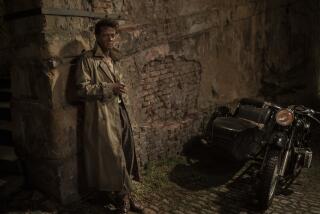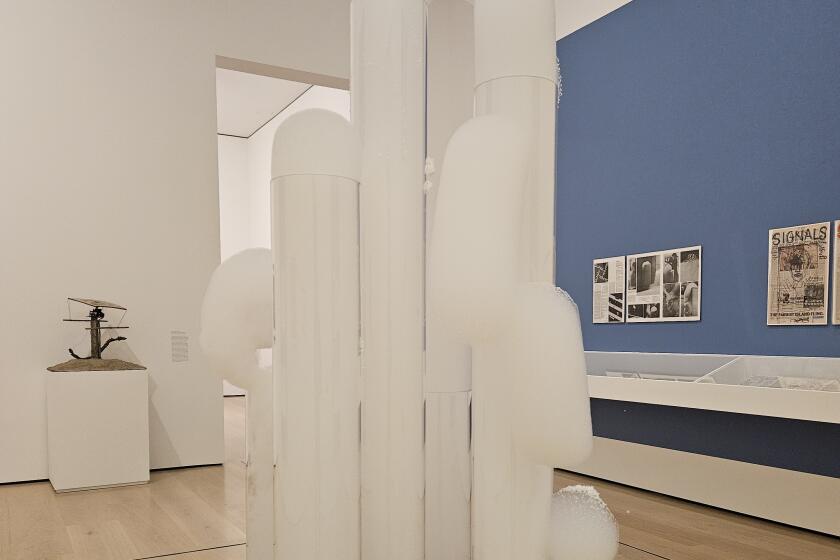OPERA REVIEW : Pistol-Packin’ Puccini at the Met
The Metropolitan Opera has expended rousing, loving care on its new production of “La Fanciulla del West.”
Placido Domingo heads a luxurious, sensitively selected cast. Making his debut in the Met pit, Leonard Slatkin brings flamboyant zeal and a nice measure of hearty nostalgia to Puccini’s rip-snortin’, pistol-packin’, moonstruck platitudes. Michael Scott has designed vast decors that pay equal respect to the rough Gold Rush ambiance and the grand grand-opera context.
The most striking contribution to this emphatically successful project would seem to come, however, from the stage director: Giancarlo del Monaco.
To any aficionado who owns some recordings or whose memory stretches back to the ‘50s, the name must invoke a fond resonance. Giancarlo, now 48, is the son of the late Mario del Monaco, the handsome, passionate tenore robusto whose Otello set standards virtually unchallenged even now. Del Monaco pere , not incidentally, was also celebrated for his recording of Dick Johnson opposite an unlikely girl of the golden west called Renata Tebaldi.
Giancarlo del Monaco is celebrated, and sometimes castigated, as an avant-gardist who likes to tinker with operatic tradition. His boldly innovative, politically oriented productions in Germany have included a “Butterfly” set in post-war Vietnam (“Miss Saigon” got there later) and, most controversial, a “Nabucco” in which the biblical protagonist resembled Saddam Hussein.
No one would have been too surprised if Del Monaco had played Puccini’s horse opera on the moon, in a swimming pool or at a Viennese cafe. But this man is no fool. For his introduction to ultraconservative New York, he adopted a liberal literal posture.
His “Fanciulla” may be the most realistic, the most detailed, the most atmospheric version since the world premiere, which happened to be presented by the same company 81 years ago.
Del Monaco pays Puccini the compliment of taking the melodrama seriously. He motivates the characters carefully, banishing as many operatic cliches as possible. He brings authentic urgency even to those silly scenes in which the crusty American miners must behave like lusty Italian choristers. Quite properly, in this instance, he demonstrates the courage of the composer’s naive convictions.
When the director dares make a change, it actually may be a change for the better. He moves the last act from the traditional clearing in the forest to the bleakly symbolic main street of a ghost town. Although the ultimate battle of wits may not take place at high noon, it certainly is haunted by some friendly cinematic spirits.
At the end, where Puccini simply ignored the complex figure of the quasi-villainous sheriff, Del Monaco arranges for a reconciliation of sorts. Minnie actually shakes Jack Rance’s hand. Then, as the curtain falls, the tenor and soprano stride off into the sunset, leaving the agonized baritone alone on the stage to confront his ghosts. It is a strangely moving solution to an always vexing dramatic problem.
Perhaps Del Monaco has given us the ultimate oxymoron: a thinking person’s “Fanciulla del West.”
At Wednesday’s performance, Barbara Daniels found just the right combination of gutsy strength and mushy sentiment for the title role. This Minnie knew when to be gawky, when to be vulnerable and when to be tough (it wasn’t her fault that her prop pistols misfired at her entrance). Unlike some predecessors, she put aside all thoughts of prima-donna glamour and, apart from a few pitch problems in the high climaxes, sang with compelling radiance. Contrary to dire predictions (some of them voiced in this corner), her conversion from soubrette to spinto seems to be progressing nicely.
Domingo repeated his familiar interpretation of the outlaw-hero, brooding ardently, flirting ardently, suffering ardently, singing ardently. He has few if any rivals in this role.
Sherrill Milnes played the ambiguous Sheriff Rance with nearly sympathetic bravado, puffed stoically on his nasty cigar, and sang with incisive fervor.
The minor roles--all 15 of them, plus chorus--were deftly delineated, thoughtfully differentiated. Each and every scraggly participant exuded credulity, even in a saloon that resembled an airplane hangar and a hut that could pass for a mountain resort. Everyone even seemed to shiver in the second act when the snow fell in massive, picturesque torrents.
The Met still thinks best when it thinks big.
The performance in question was videotaped for a telecast on June 10. The same cast will be reassembled for the national radio broadcast on April 11. Attention should be paid.
More to Read
The biggest entertainment stories
Get our big stories about Hollywood, film, television, music, arts, culture and more right in your inbox as soon as they publish.
You may occasionally receive promotional content from the Los Angeles Times.






